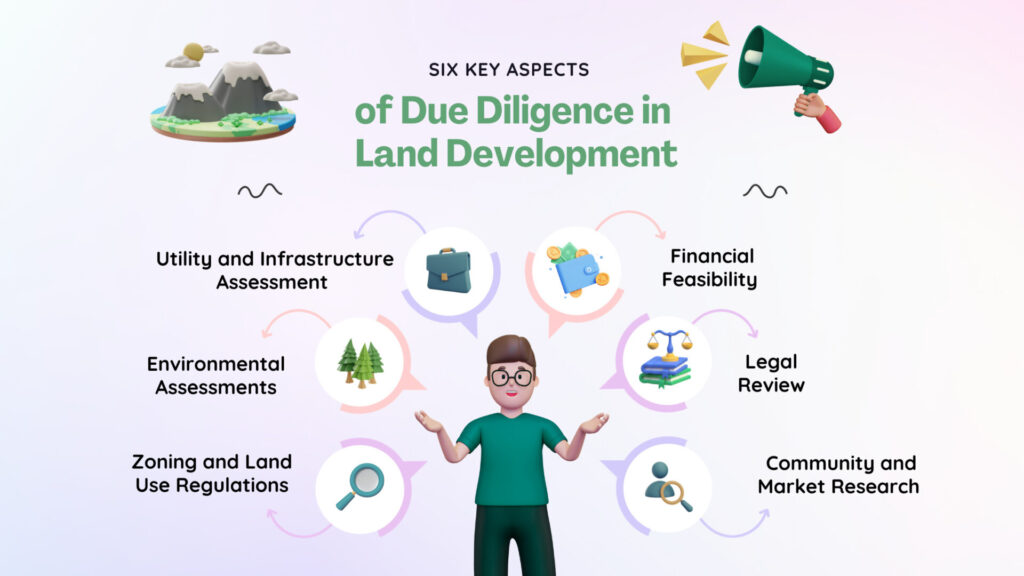Purchasing raw land is a tricky endeavor. It’s not as simple as buying a residential property where you can back out if you uncover issues during a short inspection period. Once you close on a land purchase, you own it outright, potential problems and all.
That’s why thorough due diligence is so critical for land deals. You have to do your homework beforehand to ensure you know exactly what you’re getting into. Cutting corners on the front-end research can leave you saddled with a worthless lemon. Proper investigation protects you from making a catastrophic mistake.
So what should your due diligence process entail when evaluating a land purchase? Grab a fresh cup of coffee and let’s dive into the key steps…
Craft a Smart Purchase Contract
First things first, make sure you structure the purchase contract in a way that provides adequate time for due diligence. Don’t box yourself into an unrealistically tight closing deadline. Trying to cram research into a shortened timeline leaves you vulnerable to missing red flags.
Aim for terms that afford at least 30-60 days for you to comb through the property meticulously. Sellers may push back on offering an extended diligence period, but stand firm. The extra 2-4 weeks could end up saving you tens or hundreds of thousands by avoiding a botched deal.
Also be sure the contract stipulates timely delivery of all relevant property documentation from the seller. Title reports, surveys, easements, leases, tax and assessment history, appraisals – anything that can provide useful background on what you’re purchasing.
Vet the seller’s attorney to ensure you’re getting complete and accurate information. With vacant land, ownership interests can get murky, especially if it’s been passed down for generations. You want to confirm you have a full picture of who actually has claim to the property.
Follow a Trusted Due Diligence Checklist
Due diligence for land gets complex in a hurry. Working without a comprehensive checklist inevitably leads to oversights and mistakes. You absolutely need one to make sure you methodically cover all your bases.
Start by running through basic legal and administrative due diligence to confirm the property checks out. Verify clean title, ownership interests, proper zoning classification, tax status, etc. Not glamorous work, but exceedingly necessary.

Look for Environmental Red Flags
Land can harbor all kinds of troubling environmental issues if you don’t investigate thoroughly. Do your homework to sniff out problems early before you’re committed to the site.
Look beyond contamination risks. The natural features of the land itself – wetlands, flood zones, endangered species – can also determine what you’re allowed to do on the site. Tread very carefully here.
Consult qualified environmental engineers and consultants to assess potential issues. If the property has a history of commercial or industrial use, be especially vigilant. Past activities like gas stations, chemical storage or waste dumping can leave lasting impacts.
Decode the Municipal Maze
Local zoning codes and development regulations have an enormous influence over what you can and can’t do on a property. Make sure you understand the specific rules and restrictions governing that parcel before committing.
Study the permitted land uses, density allowances, setback minimums, tree conservation mandates, traffic impact requirements, and the myriad other municipal controls that dictate development feasibility. It varies significantly between jurisdictions.
Lean heavily on land use attorneys and civil engineers here. They speak fluent bureaucrat and can help decode complex zoning provisions to avoid violations down the road.
Click here to learn more and subscribe to the newsletter
Scrutinize Development Feasibility
Crunch the numbers to determine if your conceptual plans for the land investment or development actually pencil out in reality.
Carefully consider access, utility availability, topography, total buildable area, target market conditions, traffic impacts, proximity to amenities, and all the make-or-break factors that determine project success.
Be mentally ready to pivot. The realities on the ground often force changes as more is learned about the property’s constraints. Flexibility is key as site plans morph to fit the site’s limitations.
If you’re new to land development, lean on an experienced consultant or developer to provide feasibility expertise. Their insights can prove invaluable.
Follow the Money
Ultimately, profitability potential will determine whether an investment or development project gets the green light. Run the numbers to ensure the financials work.
Build detailed programs to analyze anticipated revenues, construction costs, professional fees, carrying costs, entitlement expenses and all the monetary factors that collectively determine profitability.
Be conservative with your projections and keep an eye on the bottom line. At the end of the day, the deal has to make economic sense.
Sequence Wisely
Due diligence is a cascading process. One finding inevitably leads to another probe, which triggers another, and so on. Be intentional about how you stage your research activities.
Front-load potential dealbreaker assessments before sinking money into peripheral studies. And understand how early findings will dictate additional scrutiny.
For example, if initial surveys show an endangered species on site, you’ll likely need to commission a biologist study before assessing development feasibility. Sequence intelligently to avoid wasting time and money.
Conclusion
Mistakes with land are costly. Very costly. Having an experienced real estate consultant in your corner can save you from expensive missteps.
Land deals have immense nuance. Don’t assume you can DIY the diligence, especially if you’re new to vacant land sites. Let seasoned pros handle the heavy lifting and provide the insights you need to make shrewd business decisions.
Few investments provide a higher ROI than expert guidance. Pay a few thousand for quality consulting and avoid regrettable oversights that could cost you dearly.
There you have it – a comprehensive overview of the essential due diligence steps for land purchases. It may seem daunting, but being methodical and leaning on expertise paves the path to success. Do it right from the outset and you’ll be glad you did.
Interested in multifamily real estate investing? Our experienced team is here to help. From market research to identifying the best opportunities, we guide you through the process. Subscribe to our YouTube channel for informative videos and expert discussions, and follow us on Instagram for exclusive content. Explore our comprehensive Udemy course for detailed insights and strategies. Ready to elevate your investment journey? Contact us now to schedule a consultation and achieve your financial goals in real estate.
*This content is for informational purposes only and is not intended as financial or legal advice. Please consult with a professional advisor before making any investment decisions.




























